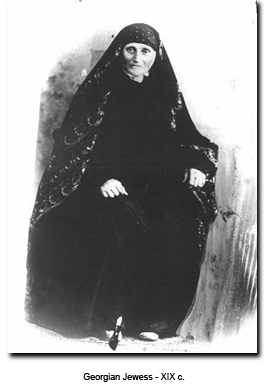Jews
 It is well known that as a people who were removed from the bulk of their historic homeland the Jews scattered in dozens of countries and living in permanent danger of assimilation, if not annihilation, but the danger have never taken place in Georgia. From ancient times in this country these two people were living and live up to now in mutual respect, common understanding, etc.
It is well known that as a people who were removed from the bulk of their historic homeland the Jews scattered in dozens of countries and living in permanent danger of assimilation, if not annihilation, but the danger have never taken place in Georgia. From ancient times in this country these two people were living and live up to now in mutual respect, common understanding, etc.
According to the legend, which recorded in Georgian written source, namely "Qarthlis tskhovreba" - that sacred book of the Georgians, when envoys arrived in Georgia from Jerusalem with the tidings of the impending trial of Jesus Christ, and two Georgian Jews Elioz Karsneli and Longinoz Mtskhetheli were setting out for Jerusalem the mother of Elioz implored her son not to take part in the evil deed that was about to be perpetrated. And when Christ died on the cross in Jerusalem, the mother of Longinoz, sensing it, died. The Georgian Jews returned, bringing with them the tunic of our Lord. The sister of Elioz, pressing it to her heart, expired on the spot. According to tradition, the tunic is buried with her in the holy ground of Mtskhetha (old capital of Georgia).
Here it may also be mentioned that - owing to what happened in Mtskhetha - the Georgians do not consider the Georgian Jews as accomplices in the crucifixion of Christ; this - in conjunction with the characteristic trait of the Georgians of tolerance of other religions and of representatives of other nationalities - played its role in the attitude to Jews residing in Georgia for centuries.
The Jews knew the Georgians from the Ancient Ages and on the contrary. It is known that the study on Georgia originated in Jerusalem in the 12th century, and the study of problems of Jewish history has its old traditions in Georgia.
Georgian sources refer to the arrival of Jews in Western Georgia in the 6th century, evidently from the Byzantine Empire, and the further migration of 3,000 Jews into Eastern Georgia. The ancient Georgian historic annals associate the appearance and settlement of the first wave of Jews with the conquest and devastation of Jerusalem by King Nebuchadnezzar of Babylon. According to the Georgian chronicle "Qarthlis tskhovreba" this king destroyed and devastated Jerusalem and the Jews pursued by him, came to Qarthli". The fall of Jerusalem took place in 586 BC and this is the time when the Jewish pariahs entered Qarthli. It as also notable that the immigrants applied to the governor of Mtskhetha (the ancient capital of Georgia) appealing for the right to settle there, for which they promised to pay an appropriate contribution. The governor of Mtskhetha stretched out a helping hand to these miserable refugees and "allocated to them a part of the shore of the Aragvi River, called Zanavi, and it became their land". Latter, the Jews moved from this place to other towns and cities that were the centers of trade. The chronicle of Qarthli`s conversation dates the settlement of the Jews in Mtskhetha back to the year 169 BC.
It is doubtless that in the towns of Qarthli of the Hellenistic period in Mtskhetha and Urbnisi - the "Hebrew regions", where the Jewish population lived, already existed; this is where their ethnic and religious communities were situated. There, beginning from ancient times, the Jews maintained their cult centers, the so-called "Hebrew sanctuaries", which served as the first synagogues. Perhaps the priest Abiatar, mentioned in the life of Saint Nino, before adopting the Christian faith was an acolyte of the "Hebrew sanctuary" and a follower of Judaism. Traces of the life of old Jewish communities have been maintained in the ancient Hebrew epigraphic monuments discovered in Qarthli.
where their ethnic and religious communities were situated. There, beginning from ancient times, the Jews maintained their cult centers, the so-called "Hebrew sanctuaries", which served as the first synagogues. Perhaps the priest Abiatar, mentioned in the life of Saint Nino, before adopting the Christian faith was an acolyte of the "Hebrew sanctuary" and a follower of Judaism. Traces of the life of old Jewish communities have been maintained in the ancient Hebrew epigraphic monuments discovered in Qarthli.
 where their ethnic and religious communities were situated. There, beginning from ancient times, the Jews maintained their cult centers, the so-called "Hebrew sanctuaries", which served as the first synagogues. Perhaps the priest Abiatar, mentioned in the life of Saint Nino, before adopting the Christian faith was an acolyte of the "Hebrew sanctuary" and a follower of Judaism. Traces of the life of old Jewish communities have been maintained in the ancient Hebrew epigraphic monuments discovered in Qarthli.
where their ethnic and religious communities were situated. There, beginning from ancient times, the Jews maintained their cult centers, the so-called "Hebrew sanctuaries", which served as the first synagogues. Perhaps the priest Abiatar, mentioned in the life of Saint Nino, before adopting the Christian faith was an acolyte of the "Hebrew sanctuary" and a follower of Judaism. Traces of the life of old Jewish communities have been maintained in the ancient Hebrew epigraphic monuments discovered in Qarthli.
It is clear that the Jewish community living in Georgia adopted the Georgian language from the very beginning, thus adapting themselves to Georgian folk rituals, as well as to local popular customs and habits. At the same time, they remained deeply loyal to Judaism. The Jews toiled and fought side by side with the Georgians, for Georgia became a second homeland to them; therefore, they felt committed and took care of the progress and further development of the country in the same way as the Georgians themselves did. The Georgian and Jews populations enjoyed the same rights, and the legal equality between them has never been violated.
 According to the census of 1800 in Georgia were living 3,3 thousand Jews; in 1832 - 4,0; in 1865 - 7,8; 1886 - 11,7; 1897 - 17,2; 1926 - 30,115; 1939 - 42,480; 1959 - 51,6; 1970 - 55,4; 1979 - 28,3; 1989 - 24,8.
According to the census of 1800 in Georgia were living 3,3 thousand Jews; in 1832 - 4,0; in 1865 - 7,8; 1886 - 11,7; 1897 - 17,2; 1926 - 30,115; 1939 - 42,480; 1959 - 51,6; 1970 - 55,4; 1979 - 28,3; 1989 - 24,8.
According to the 1897 census 6,407 Jews in the Russian Empire considered Georgian their native language. According to the 1926 census, the only census where each of the Jewish ethnic and linguistic groups appeared as a separate entity, there were 21,471 Georgian Jews in the Soviet Union.
The 1959 census reported 35,673 Jews considered Georgian their native language. Estimates based on the 1959 and 1970 censuses showed that the number of Georgian Jews in the Soviet Union in 1970 reached 43,000. About 70% of them left for Israel in the course of the next decade.
There were some Georgian Jews who were registered as Georgians and not as Jews but no reliable estimate of their number was available. The Georgian Jews lived mostly in Tbilisi (Tiflis), capital of Georgia, the other centers being Qutaisi, Kulashi, Tshinvali, Gori, Oni, Sachkhere, Senaki, Zugdidi, as well as in many other cities, towns and villages of Georgia. See '
Soviet censuses reported 28,300 Jews in 1979 and 24,800 in 1989; 14,300 of the latter were Georgian Jews who have preserved their ethnic and religious distinctiveness despite speaking the same language as their host nationality. At the end of 1991, there were 21,700 Jews in Georgia.
In 1989, 488 Jews emigrated. In 1990, 1,603 (including 911 from Tbilisi) immigrated to Israel. The corresponding figure for1991 were 1,502 and 822. Economically and socially the Georgian Jews are well integrated in the larger community. They generally have been less interested in emigration than the Jews in other republics.
There were an estimated 14,500 Jews in Georgia at the end of 1993. The rate of immigration from Georgia to Israel was high: 2,595 left Georgia for Israel in 1992, and 3,750 - in 1993. Jewish immigration to the U.S. from Georgia increased from 305 in 1992 to 345 in 1993.
Sources:
- M. Lordqiphanidze, Essays on Georgian History, Tbilisi 1994, p. 3-4;
- R. Metreveli, Jews in Georgia, Tbilisi 2002, pp. 26-31;






